Definition, case study, templates and more resources for attorneys
Legal terms • contract • master service agreement
Jump to ↓
| What is an MSA? |
| Common risks |
| What should be included in an MSA? |
| More resources |
What is a master service agreement (MSA)?
A master service agreement (MSA) is a fundamental contract outlining the scope of the relationship between two parties, including terms and conditions for current and future activities and responsibilities. There is great value in using these arrangements, especially for entities with multiple agreements pertaining to the same client.
MSAs are contracts that formulate the basic terms between vendors and clients at the beginning of a business relationship. This initial agreement helps to speed up the negotiation process for future contracts and facilities the project management process, resulting in a more efficient and streamlined process. By establishing these basic terms upfront, subsequent agreements can be more easily negotiated and agreed upon, saving time and money for everyone involved. Due to their ability to simplify the contract negotiation process, MSAs are a popular choice for businesses of all types.

CoCounsel Legal
Bringing together AI, trusted content, and expert insights for contract review and drafting
Go professional-grade AI ↗There are several important considerations when crafting an MSA and creating one can offer many benefits for organizations and individuals looking to bolster the speed and efficiency of their business arrangements and deliverables. They accomplish this by offering a good balance of consistency to a business relationship as well as the flexibility to make changes necessary to adapt to evolving circumstances. To that end, these agreements are especially useful for entities engaged in long-term business relationships with one another.
The coming sections will explore in detail how these frameworks are crafted, where they are most useful, some specific clauses included in them, and some potential concerns for those who engage with them. Additionally, some examples of existing MSA language and terms are also included for reference.
What does an MSA accomplish?
As an important document for businesses, an MSA outlines the duties and commitments of all parties involved. This legally binding agreement sets forth the terms and conditions of a service agreement, including services provided, pricing models, payment methods, ownership rights, and more. It functions as a contract between two or more parties to guarantee that essential agreements are in place before any service commences.
An MSA serves to minimize disagreements by providing an unmistakable description of what the parties can expect from one another. It can also be a limitation of liability or safeguard costs that may result if either side fails to deliver as promised. In some cases, it might include details such as dispute resolution techniques like mediation or arbitration should any issues appear during the course of the agreement.
MSAs are usually used to lay out the nitty-gritty legalese considerations that are usually of interest to the transactional lawyers working on an agreement, while the subsidiary arrangements and agreements are, generally, more helpful to the operations teams. Having a proper MSA with clearly defined terms and conditions for both parties involved can help offer greater protection against unforeseen risks or losses associated with a service agreement.
While there is no set rule about what types of entities would best be served to craft an MSA, there are a few that MSAs are used for, such as:
- Software license agreements
- Privacy policies
- Indemnification of a third-party
- How to manage private information, and
- An alternative solution of attorney fees
It is critical for attorneys handling MSAs to have a firm grasp of the holistic considerations included in an MSA as they can sometimes be challengingly broad. To that end, it is not uncommon for a master agreement to cover disparate, unrelated transactions, so understanding the context of the framework takes on even greater significance for attorneys working in this space.
Benefits of an MSA
As an invaluable asset for any business relationship, MSAs offer a range of advantages and benefits that can help improve operations and protect against potential risks. An MSA encourages transparency by outlining the expectations of both parties in writing, allowing them to easily refer back to it, should any issues arise. Negotiations on terms and conditions within the agreement can also be conducted by both parties, giving them more control over how their services are delivered.
Also, MSAs protect from potential disputes which may arise between the two parties involved in the agreement. They also help streamline operations by providing detailed guidance about how services should be delivered and save time and money due to no longer requiring lengthy negotiations or redrafting contracts every time something changes or needs amending. All of this reduces the chances of costly mistakes being made due to miscommunication or misunderstandings.
Investing in an MSA proves beneficial as it promotes transparency and flexibility while protecting against expensive disputes. It also helps streamline processes while saving time and money which would otherwise be spent on negotiating terms or redrafting contracts. Therefore, businesses looking to set up a service with another party should highly consider getting an MSA to ensure a successful business relationship going forward.
What are some common risks of an MSA?
When it comes to master service agreements, there are a few potential pitfalls that businesses should be aware of. Some disputes include the injury or death of an employee, property damage, timely communications with respect to requests for business updates, deadlines, payments, product defects, and purported unauthorized charges contributing to allegations of cheating or foul play.
One of the biggest risks is failing to accurately predict the work required for the project, resulting in misunderstandings over responsibilities and obligations. Additionally, MSAs may not include provisions for cost overruns or scope changes — so any extra services or additional costs must be negotiated separately which can already take up a lot of a party’s time.
Furthermore, these agreements also rarely provide for dispute resolution or litigation procedures — meaning that disagreements between two parties can become costly to settle. If one party isn’t satisfied with the workload or the result of the work, then parties may accuse each other.
Moreover, service providers could hesitate to accept certain terms due to fears of liability — such as warranties and indemnification clauses which can leave them liable for client losses incurred from their services. It is therefore critical for businesses creating an MSA to consider these risks before signing a contract and take appropriate measures before continuing the contract process. Knowing possible issues ahead of time will ensure both sides are satisfied with its conditions.
Litigating a breach of contract action: The answers you need and how to proceed when litigating a matter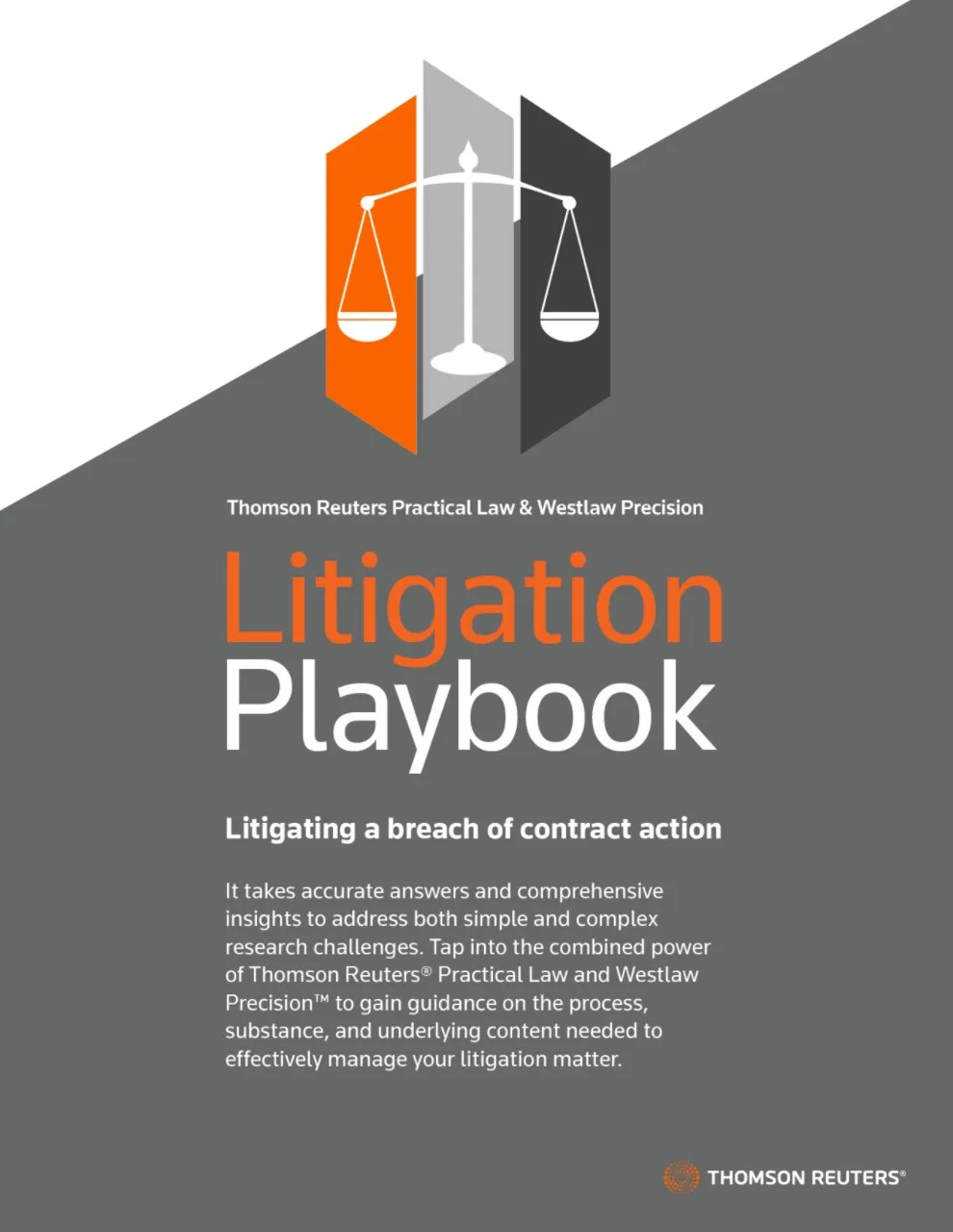
Playbook by Practical Law
Terminating the agreements can become especially tricky, too, especially when there is work in progress under, for example, a statement of work (SOW) associated with an MSA.
Like any business arrangement or agreement, the success of the relationship will depend on the time and energy put into the details of the work. MSAs are no exception, and with proper diligence, many of the above-stated issues can be avoided before they manifest into something prohibitive. By addressing common risks associated with MSAs upfront, companies have a better chance of avoiding unexpected losses down the line. This helps protect their interests while minimizing potential exposure during negotiations.
What should be included in an MSA?
MSAs, in general, are a holistic consideration with far-reaching implications. As such, there are several important components to a working MSA. While each agreement will inevitably vary based on a wide range of variables, some examples of existing MSAs do highlight some key characteristics worth considering for those interested in developing such an agreement.
When constructing an MSA, certain components must be included such as services to be furnished, delivery dates and timelines, payment terms and conditions, indemnification and termination, confidentiality clauses, and intellectual property rights.
All facets of the agreement need to be accurately described in order to ensure accuracy and effectiveness. Any modifications or amendments made to the MSA should be documented so that both parties have access to an up-to-date version at any point throughout its duration. As such, it is essential to ensure that the MSA is accurate and effective in order to protect both parties’ interests. This can be done by including certain elements in the MSA.
Primarily, the agreement should list the names and addresses of all involved parties so they can be identified if any issues arise. Additionally, it must provide an extensive description of services being provided such as products/services offered, duration, delivery dates, payment terms, etc., allowing both sides to know what to expect throughout the contract’s duration. Next, each party’s responsibilities should also be clearly defined in order to avoid potential misunderstandings or conflicts.
Payment terms like pricing structure, invoicing details, and payment schedules are also necessary for an MSA; providing clarity on how payments will be handled while avoiding disputes caused by miscommunication regarding payments down the line. Furthermore, clauses specifying governing law and jurisdiction for disputes must be included in order to guarantee legal procedures are followed correctly if a disagreement arises during its term.
Finally, modifications or amendments need to be noted over time so changes are accounted for; otherwise, businesses risk invalidating existing parts of their agreement which could lead to costly disputes further down the line. Having access to an up-to-date version at all times also prevents confusion about what was agreed upon previously.
Implementing these components into an MSA ensures transparency between two parties while safeguarding against unexpected risks or losses associated with a service agreement. It additionally encourages flexibility and streamlines operations by giving detailed directions about how services should be delivered throughout its term; ultimately saving money and time while helping foster positive relationships with clients.
MSA templates and standard documents
A template is a pre-set format of a legal contract that is often used by businesses. Using a template results in saving time and money. Many templates of MSAs are available for a business to use while entering into a contract, based on the type of contract and the obligations of the parties.
General service level agreements
Professional services agreements are used for the engagement of professional services, which may be for a specific project, ongoing services, or an MSA.
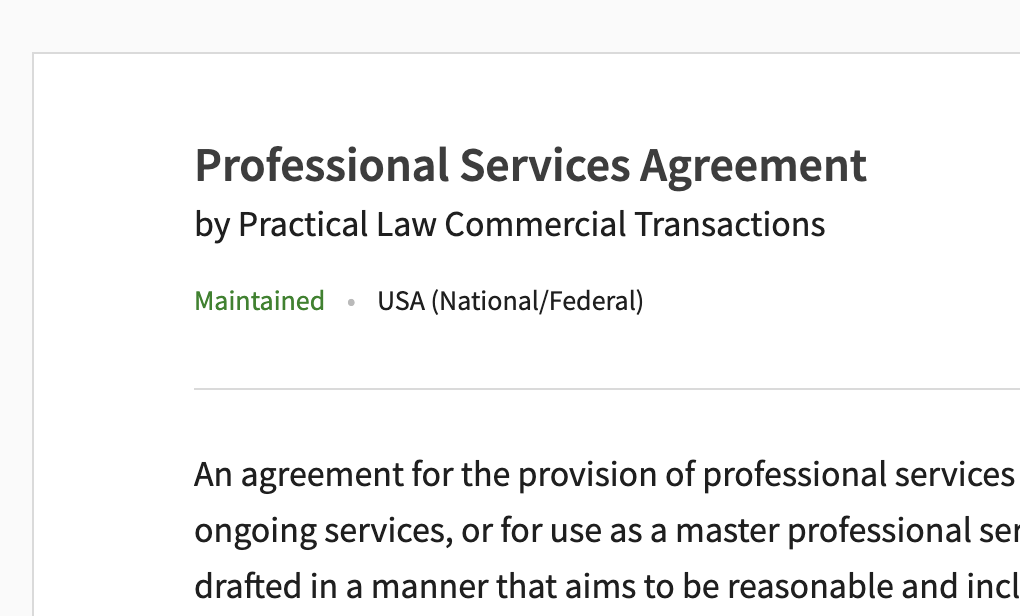
Professional services agreement
Includes common provisions in negotiated services agreements
Access with free trial ↗Service level agreement
Service level agreements (SLAs) are standard documents used in outsourcing agreements to set out service levels. An SLA is often attached either to the Statement of Work (SOW) or the MSA.
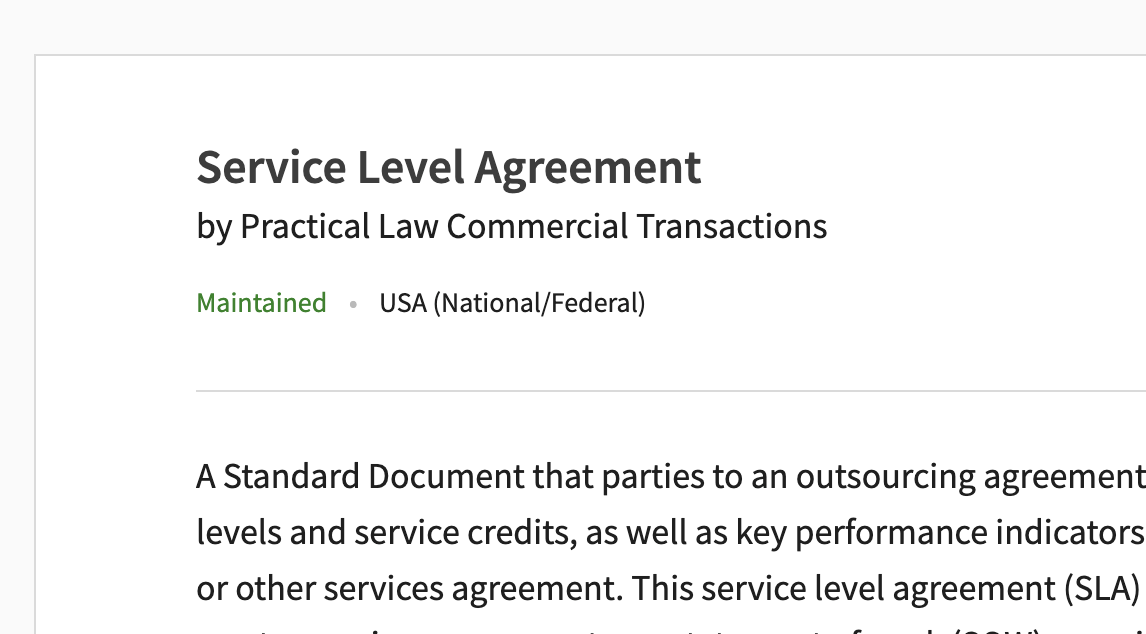
Service level agreement
A Standard Document that parties to an outsourcing agreement
Access with free trial ↗Marketing service level agreements
Promotion and Marketing Services Master Agreements are used in circumstances where there are multiple promotional and marketing projects for products or services and the company is conducting promotion and marketing activities on behalf of a client. Typical provisions used in this template are related to ownership of deliverables, approval rights, and client account staffing.
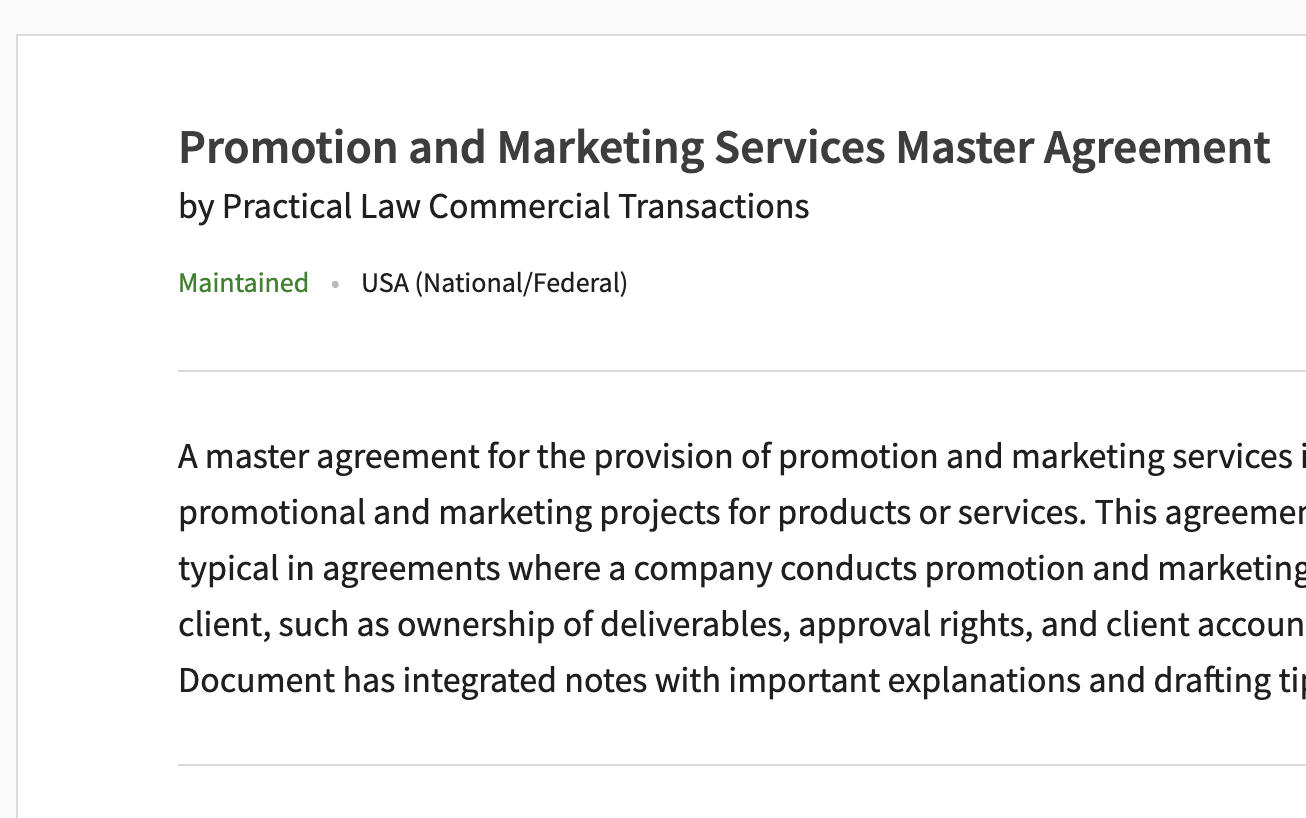
Promotion and marketing
A master agreement for the provision of promotion and marketing services
Access with free trial ↗Master Online Marketing Services Agreements are preferred in agreements involving digital and internet marketing services. The terms of this agreement are often neutral and reasonable and intended to favor both the provider and the recipient of the service.
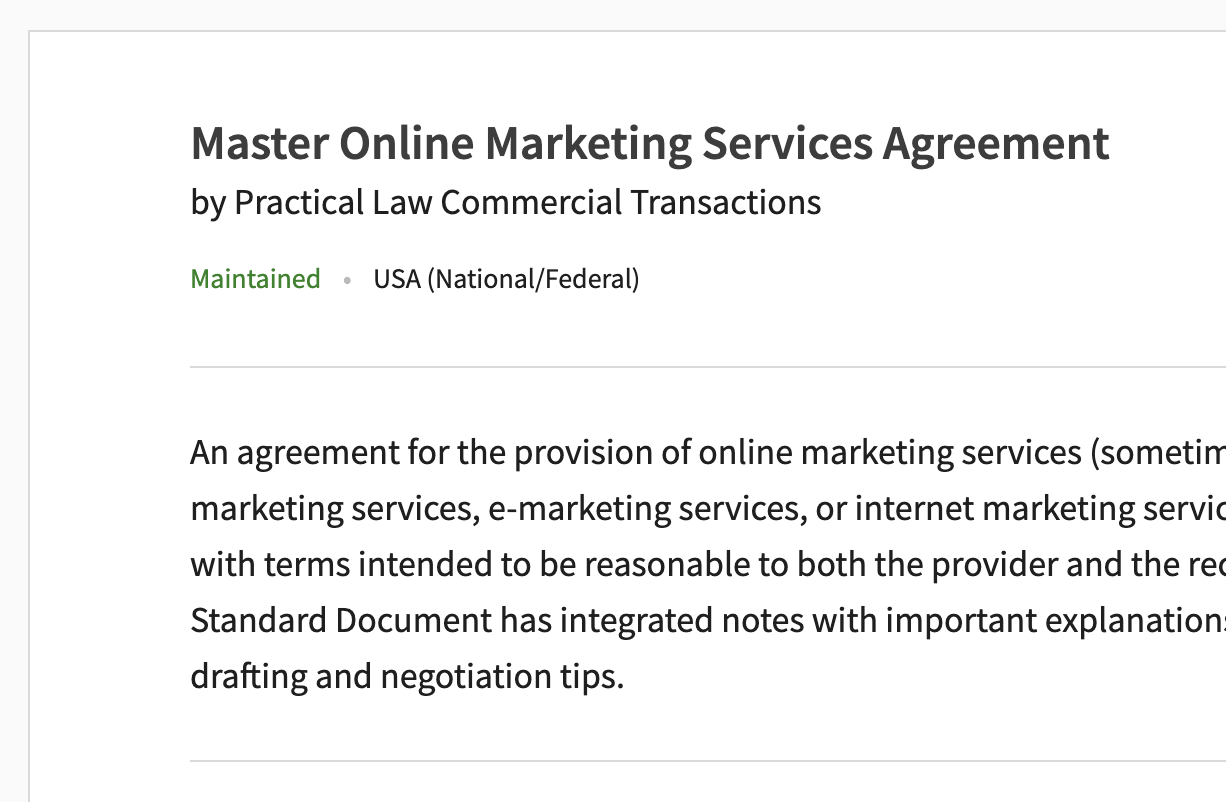
Online marketing
A master online marketing services agreement for online marketing services
Access with free trial ↗
Service agreements by state
Some templates are categorized based on the state of operation and governing law. These templates are more often than not drafted from the perspective of the service provider and not the customer and aim to be reasonable. The templates may be for a specific project, ongoing services, or an MSA.
- Services Agreement (Pro-Service Provider) (CA) ↗
- Services Agreement (Pro-Service Provider) (CO) ↗
- Services Agreement (Pro-Service Provider) (FL) ↗
- Services Agreement (Pro-Service Provider) (GA) ↗
- Services Agreement (Pro-Service Provider) (IL) ↗
- Services Agreement (Pro-Service Provider) (PA) ↗
- Services Agreement (Pro-Service Provider) (MA) ↗
- Services Agreement (Pro-Service Provider) (MN) ↗
- Services Agreement (Pro-Service Provider) (MO) ↗
- Services Agreement (Pro-Service Provider) (NJ) ↗
- Services Agreement (Pro-Service Provider) (NY) ↗
- Services Agreement (Pro-Service Provider) (OH) ↗
- Services Agreement (Pro-Service Provider) (TX) ↗
- Services Agreement (Pro-Service Provider) (TN) ↗
- Services Agreement (Pro-Customer) (CA) ↗
- Services Agreement (Pro-Customer) (CO) ↗
- Services Agreement (Pro-Customer) (FL) ↗
- Services Agreement (Pro-Customer) (GA) ↗
- Services Agreement (Pro-Customer) (IL) ↗
- Services Agreement (Pro-Customer) (PA) ↗
- Services Agreement (Pro-Customer) (MA) ↗
- Services Agreement (Pro-Customer) (MN) ↗
- Services Agreement (Pro-Customer) (MO) ↗
- Services Agreement (Pro-Customer) (NJ) ↗
- Services Agreement (Pro-Customer) (NY) ↗
- Services Agreement (Pro-Customer) (OH) ↗
- Services Agreement (Pro-Customer) (TX) ↗
- Services Agreement (Pro-Customer) (TN) ↗
Sale of goods agreements
A Master Sale of Goods Agreement (Pro-Seller) is used in agreements involving the non-exclusive sale or supply of goods. Standard terms include provisions related to ordering procedure, shipment, price, payment, product warranty, etc. This template favors the seller or supplier of goods.
Master Sale of Goods Agreement (Pro-Buyer) is similar to the master sale of goods agreement (pro-seller), with terms and conditions being similar, the only difference being that the agreement is drafted in favor of the buyer.
Case study: ProQuest Company and International Business Machines Corporation
ProQuest, a Delaware company with its chief offices in Ann Arbor, Michigan engaged in an agreement with the International Business Machines Corporation with respect to an information technology services and products contract. The MSA, posted here via the U.S. Securities and Exchange Commission, provides helpful insights into some of the chief components of a previously drafted MSA.
Notably, the scope of the agreement, provided in Article I subsequent to the Recitals, offers some particularly critical insights. As such, it established a “contractual framework” for the forthcoming provisions. ProQuest is listed in the document as the “Client Parent” while the International Business Machines Corporation is deemed the “Supplier Parent.”
The top of the agreement speaks directly to that relationship. It reads:
|
The agreement then goes on to elaborate on how that relationship would impact subsidiary parties associated with the operative entities and lays out the broader impact of the agreement as it relates to the absence of other “locally appropriate” provisions.
It adds:
|
Additionally, there are a number of definitions laid out, operational and general provisions, a lengthy list of terms and conditions, exhibits, and schedules.
More research and drafting resources
MSAs are useful because they allow the parties to make short- and medium-term plans while also speeding the ratification of future agreements. They also outline the terms and conditions of a particular service. It helps to protect both parties involved and ensures that all expectations are met, along with specifying legal procedures in case of a disagreement.
This reality is largely driven by the fact that MSAs create a substantially holistic contract framework that establishes the foundation for all future actions. An MSA should include all relevant information, such as the scope of service, payment terms, and any other important details. To ensure that an MSA is accurate and effective, businesses should be familiar with the legal requirements for such agreements and should consult with a lawyer if needed.
Businesses should also consider investing in software that can help them simplify their MSAs. By automating the process of drafting MSAs, businesses can save time by quickly creating templates based on existing documents or customizing existing templates to suit their needs. Additionally, automation software can help minimize errors while ensuring accuracy throughout the entire document.
Originally published by Thomson Reuters on July 10, 2023










